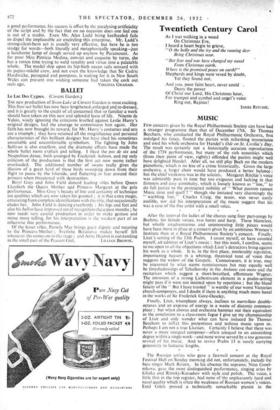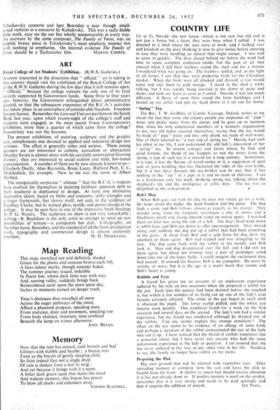MUSIC
FEW concerts given by the Royal Philharmonic Society can have had a stranger programme than that of December 17th. Sir Thomas Beecham, who conducted the Royal Philharmonic Orchestra, first indulged his fancy, flouted the purists with refreshing insouciance and used his whole orchestra for Handel's Ode on St. Cecilia's Day. The result was certainly not a historically accurate reproduction of the 1739 performance, but many of the rich sonorities which (from their point of view, rightly) offended the purists might well have delighted Handel. After all, we still play Bach on the modern pianoforte, which is no less of a crime historically. Given the large orchestra, a larger choir would have produced, a better balance ; but the chief weakness was in the soloists. Margaret Ritchie's voice was admirably pure in tone but too exiguous and lacking in that firmness and easy continuity, which is loosely known as "line," to do full justice to the protracted nobility of " What passion cannot Music raise and quell ? " though she imitated very charmingly the " warbling lute." Charles Craig, the tenor, was never easily audible, nor did his interpretation of the music suggest that his was a case of the fine artist with a small voice.
After the interval the ladies of the chorus sang four part-songs by Brahms, for female voices, two horns and harp. These blameless, but wholly unadventurous and uninteresting little pieces would have been more in place at a concert even by an ambitious Women's Institute than at a Royal Philharmonic Society's concert. Finally, Liszt's setting of the 13th Psalm. I count myself, or have counted myself, art admirer of Liszt's music; but this work, I confess, seems to me open to all the objections which Liszt's detractors bring against his work as a whole. It is, in the first place, intolerably repetitive, importuning heaven in a whining, theatrical tone of voice that suggests the widow of the Gospels. Connoisseurs, it is true, may be interested by what seems reminiscences but may equally well be foreshadowings of Tchaikovsky in the Andante con moto and the recitatives which suggest a short-breathed, effeminate Wagner. The intrusion of a strong Liebestraum element in a psalm-setting might pass if it were not insisted upon by repetition ; but the bland fatuity of the " But I have trusted " is worthy of our worst Victorian church-composers, and I doubt if there is anything much more banal in the works of Sir Frederick Gore-Ouseley.
Finally, Liszt, triumphant always, inclines to martellato double- octaves and an expense of energy in a waste of diatonic common- place ; but when chorus and orchestra hammer out their equivalent as the conclusion to a class-room fugue I give up my championship of Liszt and only wonder what can have induced Sir Thomas Beecham to inflict this pretentious and tedious music upon us. Perhaps l am not a true Lisztian. Certainly I believe that there was never a more unequal composer—often unequal to an astonishing degree within a single work—and none worse served by a too generous revival of his music. And to revive Psalm 13 is surely carrying generosity to fantastic lengths.
* * * *
The Russian artists who gave a farewell concert at the Royal Festival Hall on Sunday morning did not, unfortunately, include the bass singer Mark Reizen. In his absence the soprano, Nina Gusel- nikova, gave the most distinguished performance, singing arias by Glinka and Rimsky-Korsakov with style and polish. The voice, a little thin in the top register, had none of the unpleasantly hard and nasal quality which is often the weakness of Russian women's voices. Emil Gilds proved a technically remarkable pianist in the Tchaikovsky concerto and Igor Bezrodny as neat though small- toned violinist in a concerto by Kabalevsky. This was a sadly feeble little work, easy on the ear but wholly unmemorable in every way. An overture by the same composer, The Family of Taras, was an emptily brassy piece in Tchaikovsky's most emphatic manner but with nothing to emphasise. On internal evidence The Family of Tarns should be a Technicolor film. MARTIN COOPER.



























 Previous page
Previous page